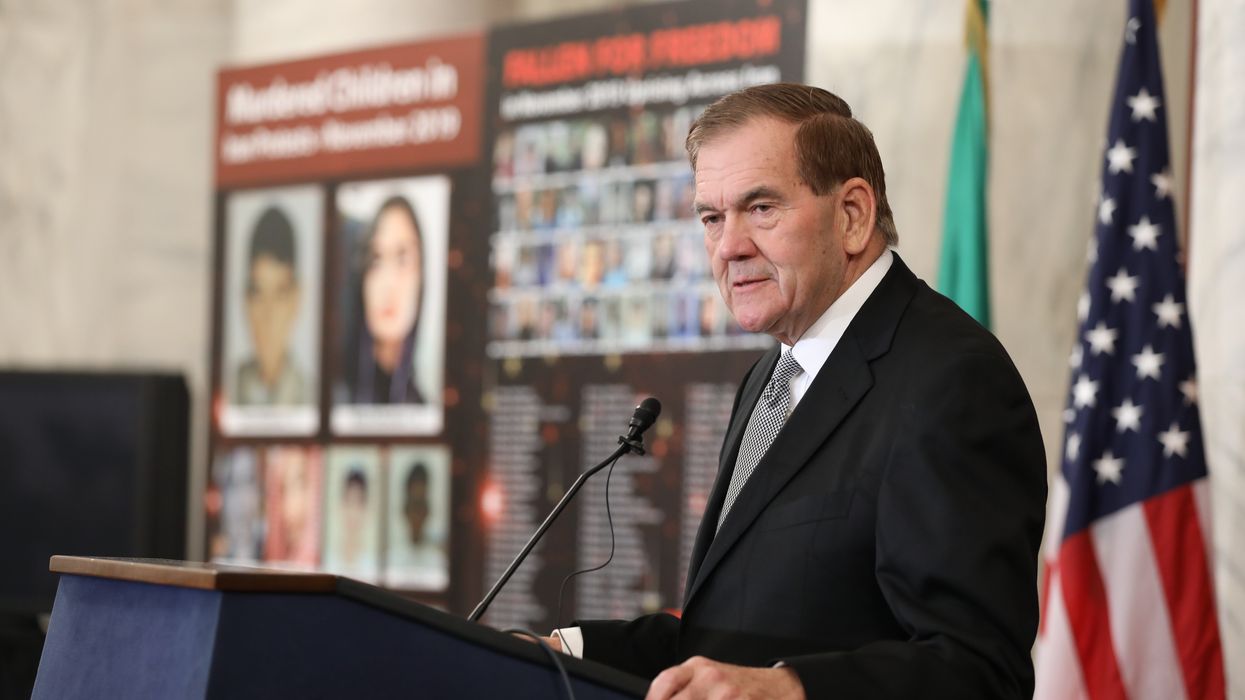President Trump's increasingly hyperbolic attacks on voting by mail, amplified by Attorney General William Barr and the Republican National Committee, have triggered alarms that the country is heading toward another contested election.
Trump appears to be gearing up to cast doubt on an outcome that doesn't go his way. Primaries marred by hours-long lines, voting machine malfunctions and controversies over absentee ballots have many bracing for a meltdown starting Election Day. A much bigger surge of mailed-in votes in November virtually guarantees the results won't be known for days, setting the stage for a crisis in voter confidence if the results are close enough to be challenged, as happened in 2000.
Yet for all that, voting rights advocates mobilizing to secure the election and neutralize Trump's divisive voting rhetoric have surprising and influential allies in their corner: many leading Republicans.
GOP governors, Republican election officials and prominent conservatives are increasingly pushing to expand voting by mail. They're also forcefully rejecting Trump's baseless claimsthe practice is "corrupt" because it invites fraud and foreign tampering — and helps Democrats, to boot.
"I think it's very sad and very disappointing that with almost five months to go, the president seems to [want to] try to delegitimize the Nov. 3 election," former Pennsylvania Gov. Tom Ridge, a Republican, told NPR after Trump's recent escalation of attacks on mail-in voting. A former Homeland Security secretary, Ridge co-chairs a new nonpartisan group, VoteSafe, formed this spring to push to expand mail-in voting and assure safe in-person voting during this pandemic-plagued election.
When the Republican National Committee recently released an error-riddled adthat suggested without evidence that voting by mail is "rigged up" to "churn out" ballots for voters with no eligibility or signature requirements, former Republican Rep. Zach Wamp of Tennessee didn't hold back.
"Shame on you!" Wamp tweeted at RNC Chairwoman Ronna McDaniel. "I've been a GOP activist at every level for 40 years. This is bull crap +our party deserves better."
Wamp starred in his own adrecently as part of a $750,000 "Making Voting Safe" campaign to urge lawmakers on Capitol Hill, particularly Senate Republicans, to increase funding for election administration during the pandemic. Congress has granted the states $400 million so far. The House has voted to allocate $3.6 billion more as part of its latest, $3 trillion coronavirus economic recovery package, but the Senate will not move to negotiate a much-less-expensive alternative until late this month.
"Many Republican governors are expanding absentee voting options, and they need Congress's help," Wamp says in the ad, paid for by Issue One Action. Wamp co-chairs Issue One's bipartisan ReFormers Caucus of former members of Congress and administration officials promoting fixes to the political system. (The advocacy group operates The Fulcrum but has no say in its journalism.)
The Republican governors of Maryland, Missouri, Nebraska, New Hampshire and Ohio have all encouraged major mail-in voting expansions in response to the pandemic.
Absentee voting has been around since the Civil War and has gained traction recently amid broad bipartisan support. Conservative Utah is one of five states to conduct its election entirely by mail. More than half the states already allow "no excuse" absentee voting, and about half of voters have cast ballots by mail this primary season, compared with 25 percent in 2018.
Absentee voting "comports with conservative principles," argues a recent white paper released by the R Street Institute, a generally right-leaning think tank
In "The Conservative Case for Expanded Access to Absentee Ballots," R Street scholars argue that voting absentee is partisan-neutral, cost-effective, secure, popular and inclusive of voters who are elderly and disabled. More Republicans are speaking out to defend mail-in voting in part out of self-preservation. Notes Matt Baca, director of VoteSafe: "The president is scaring his own voters away from an opportunity to cast their own ballot."
There is still plenty of partisan disagreement over mail-in voting, of course. While most Americans support giving voters the option to vote by mail, enthusiasm is stronger among Democrats, who have also been less likely than Republicans to vote in person during this year's primaries.
After Iowa Secretary of State Paul Pate mailed absentee ballot request forms to all registered voters ahead of the June legislative and congressional primaries, his fellow Republicans in charge of the Legislature stepped in in to prevent a similar mailing for the general election. And in battleground Michigan, a group of Trump backers staged a letter-burning to protest the state sending all 7.7 million registered voters an application to vote absentee in November
Partisan splits in voter behavior may help fuel conspiracy theories in a close election, prominent election law scholar Richard Hasen has warned. After Pennsylvania's primary a month ago featured more Democrats voting by mail, and more Republicans voting in person, Hasen noted on his ElectionLawBlog: "If this pattern holds for November and nationwide, it means that Trump could be leading in places on election night only to have the outcome change as absentee ballots are counted in coming days."
Nevertheless, voter enthusiasm for voting by mail is unlikely to disappear after the pandemic.
The recent attacks on mail-in voting "are very problematic and destructive with regard to voter confidence," acknowledges Amber McReynolds, CEO of the National Vote at Home Institute. "Election administration must be free from partisan politics."
But she adds that voters from both parties have made their preferences clear: "I do think that this has fundamentally shifted the way that Americans are going to vote going forward." Indeed, Trump's own actions may speak louder than his words — he himself voted by mail in the recent primary.
Carney is a contributing writer.




















Trump & Hegseth gave Mark Kelly a huge 2028 gift